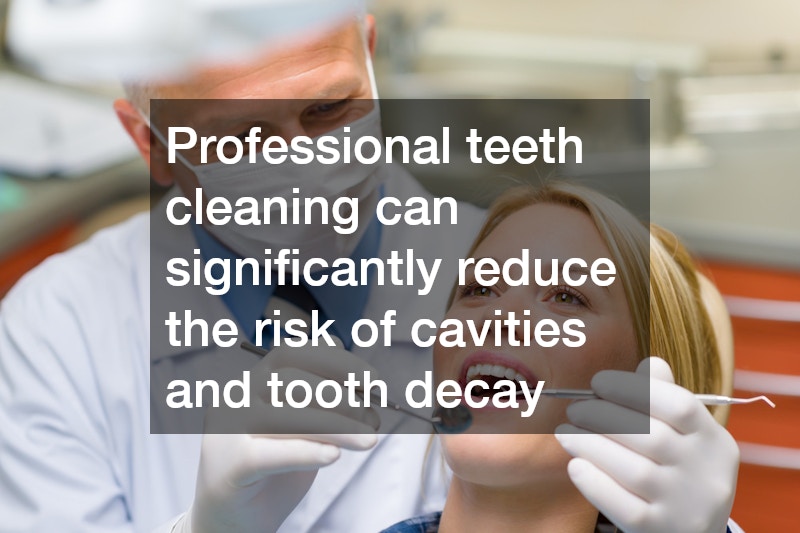
Regular teeth cleaning at the dentist is crucial for maintaining optimal oral health. It goes beyond daily brushing and flossing to remove plaque and tartar buildup that cannot be eliminated at home.
Without professional cleaning, plaque hardens into tartar, which can lead to gum disease and other dental issues.
Professional teeth cleaning can significantly reduce the risk of cavities and tooth decay. During the procedure, dentists can also detect early signs of oral health problems, such as gum disease, enabling timely intervention. This not only preserves your natural teeth but can also prevent more extensive and costly treatments down the road.
Furthermore, clean teeth contribute to fresher breath and a brighter smile, enhancing your overall confidence. A professional teeth cleaning session also educates patients on proper oral hygiene practices, which fosters better at-home dental care routines. Consequently, regular visits to the dentist for teeth cleaning are indispensable for maintaining both the health and aesthetics of your smile.
The Step-by-Step Process of Teeth Cleaning
The teeth cleaning process at the dentist involves multiple steps, each tailored to ensure thorough cleaning. It begins with a physical examination of your mouth, where the hygienist checks for signs of gingivitis or other potential concerns. This step is crucial for customizing the cleaning process to address specific dental health needs.
Following the initial examination, the dental hygienist uses a scaler to remove plaque and tartar around the gum line and between your teeth. This step is necessary, as tartar is particularly stubborn and cannot be removed by regular brushing alone. The hygienist’s expertise ensures that each tooth is meticulously cleaned to prevent future complications.
After tartar removal, the hygienist will perform a deep clean using a high-powered electric brush and a gritty toothpaste known as prophylaxis paste. This technique polishes the teeth, removing stains and any remaining plaque, ensuring a smooth surface. It also helps to enhance the luster of your smile by leaving the teeth feeling fresh and clean.
Flossing, Rinsing, and Fluoride Treatment
In the next stage of the cleaning process, the dental hygienist will floss your teeth to remove any debris between teeth and check for problem areas. This professional flossing goes beyond regular daily flossing at home by reaching areas that might be difficult for some individuals to access. It also educates patients on how to effectively floss on their own, promoting better oral hygiene habits.
Following flossing, you will rinse your mouth to remove any loose debris and dental paste residues. Typical rinses include a liquid containing fluoride, which helps to strengthen the enamel—the hard, protective outer layer of your teeth. Fluoride is a critical component in protecting against cavities and promoting overall dental health.
The final step of teeth cleaning often includes a fluoride treatment to provide additional protection for your teeth. This involves applying a foamy gel or paste onto a mouth tray, which is placed over your teeth for a few minutes. The fluoride treatment acts as a protective barrier for your teeth, reducing the risk of decay between dental visits and strengthening your enamel.
Post-Cleaning Advice and Maintenance
After your teeth have been professionally cleaned, a dentist or hygienist typically provides guidance on maintaining excellent oral health. This might include recommendations for brushing techniques, types of toothpaste to use, and guidance on selecting the right toothbrush. Such advice is essential for maintaining the effects of the cleaning and ensuring a healthy oral environment.
Patients are also reminded of the importance of regular visits to the dentist for ongoing monitoring of their dental health. These biannual appointments are crucial not just for cleaning but for early detection of any issues that require attention. Early detection can prevent potential problems from escalating into more severe and costly dental conditions.
Maintaining regular dental visits and following recommended oral hygiene practices significantly prolongs the health of your teeth and gums. By incorporating professional advice into daily routines, patients can effectively manage their oral health and reduce the likelihood of future complications. Proactive care and regular dental checkups are key components in ensuring lifelong dental well-being.
